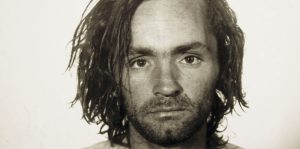
The story of a young Charles Manson that is reminiscent of other country and rock stars is told in Tom O’Dell’s Manson: Music from an Unsound Mind. You have the youthful exuberance, early burst of talent, troubles with the law, anger issues, and an impossibly charismatic protagonist that you’d expect from most bio pics. His early years sound an awful lot like Johnny Cash, Jerry Lee Lewis, or Elvis Presley. The biggest difference was Manson’s lack of focus.
Just when you thought every aspect of the Charles Manson story had been explored, O’Dell decides to focus on his failed music career. Treading over well-worn territory (his charisma, his magnetism, his manipulative tendencies) O’Dell shows how none of that was actually enough to catapult him into pop stardom. In fact, the biggest thing standing in the way of any sort of career in music was the overwhelming naïveté and sense of entitlement that was at the core of Charles Manson.
“Youthful exuberance, early burst of talent, troubles with the law, anger issues, and impossibly charismatic…”
But speaking of lack of focus, it is something O’Dell is also dealing with. For being a documentary about Charles Manson’s musical career, Manson: Music from an Unsound Mind, spends a great deal of time setting up context. There is an inordinate amount of time explaining the “Summer of Love,” the Haight/Ashbury phenomenon, the background influences and sounds of other bands, the origins of the California music scene, the Los Angeles club scene, the Maharishi, and several other topics that are only tangentially attached to the thesis. Some of it feels like an overzealous documentarian trying to give as much context as possible, some just feel like filler.
(cue funky bass line)
It feels like filler in your film
Trying to pad out time you know it isn’t such a crime
But it’s still filler in your film
You’re fighting for your life to make some killer filler toniiiiiiight
Even his Manson experts spend time talking about the history of the Byrds, the Grateful Dead, and The Doors. Two men who each wrote biographies on Manson weighing in on the histories and cultural importance of various bands.
“…does give us a glimpse into this new aspect of his character…”
Now it isn’t all like that of course. Much of Manson: Music from an Unsound Mind does give us a glimpse into this new aspect of his character we hadn’t seen before. The shy nervous Manson who learned music in prison and used songwriting as an escape from harsh realities. The singer-songwriter out of his depth around actual music industry professionals. The naïve performer who accidentally destroyed every opportunity he lucked into. But just as we’re getting that story, we suddenly derail and get some Beach Boys history and behind the scenes drama.
Of course, as we are moving closer to a tragic event, Manson gets other opportunities. The rare clips of his music featured show some of the untapped potentials that convinced producers and executives that there might be something there to exploit. But, these opportunities come to him as his mental state is deteriorating, and his grasp of objective reality is slipping.
In the end, Manson: Music from an Unsound Mind is an interesting glimpse into what might have been for one of the most notorious figures of the 20th century. It also, however, suffers from a lack of focus that makes the overarching narrative feel muddled and bogged down in minutia. I will say it is worth watching, but you might want to keep a finger ready on the fast forward button.

"…an interesting glimpse into what might have been for one of the most notorious figures of the 20th century"

I just wish people would stop repeating the myth that he orchestrated the Sharon Tate murders. There was no break in. Tex Watson was invited by Voytek Frykowski to talk about a drug deal dispute they had. Manson told the girls to just do what Tex told them; not knowing Tate would be there, get angry, and that Watson would have a bloodbath. Manson was distraught and accompanied them back to the house and faked a break in.
He was a deeply flawed human being but the only book that tells the truth is Nikolas Schreck’s The Manson File.